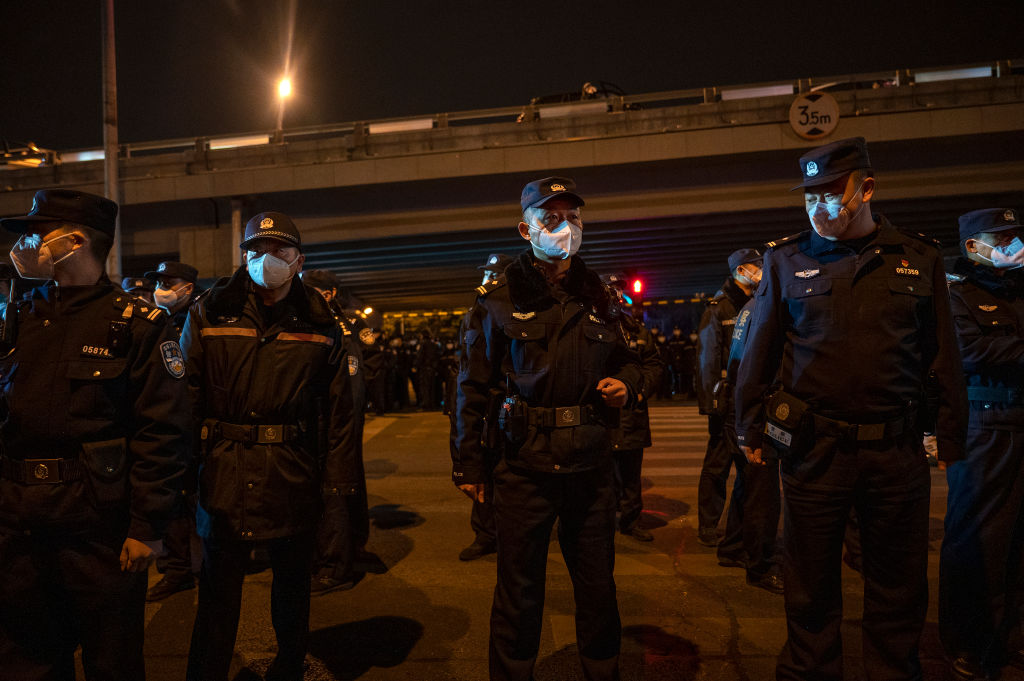Bitcoin and Ether fell in Asia trading in line with declines in equity markets in Hong Kong and elsewhere on concern about spreading protests in China against Covid-19 lockdowns that developed into rare public displays of opposition to the ruling Communist Party.
Bitcoin traded at $16,216 as of 4:30 p.m. in Hong Kong, down 1.99% in the past 24 hours, after earlier dropping more than 2%. Trading volume surged 35% in the period, according to CoinMarketCap.
Ether fell 3.48% to $1,172. A whale address transferred 73,224 ETH (US$86 million) to the Binance exchange in the afternoon, according to on-chain researcher Lookonchain. Shifting tokens to an exchange is regarded as a sell signal in crypto markets.
Asian equity markets stumbled, with Hong Kong’s Hang Seng Index dropping 4% at the opening and closed off 1.57%. The Shanghai Composite Index ended 0.75% lower, while Japan’s Nikkei 225 Index lost 0.42%.
The protests in China erupted on Friday following a fire that claimed the lives of at least 10 people in an apartment building in Urumqi in the north-western region of Xinjiang. Many people were reportedly locked inside their homes due to China’s zero-covid policy and unable to escape.
Simmering
“The wide spread of incidents indicates a wider simmering resentment of China’s approach to Covid,” said Andrew Sullivan, a market analyst and former equities broker, in a statement shared with Forkast.
Protests were reported on university campuses and in as many as eight cities. Hundreds of protestors clashed with police in Shanghai, Reuters reported, adding that the protests are the most widespread sign of discontent towards the government since President Xi Jinping took power 10 years ago.
Protestors in Shanghai were confirmed by the Associated Press to be shouting: “Xi Jinping! Step down! CCP! Step down!”
In a Twitter thread on Monday, Professor Yang Zhang, a sociologist at the U.S.-based American University, School of International Service, said that in centralized societies like China where intermediate organizations are absent people are able to organize quickly and spontaneously and they target the central authorities.
“Full centralized control leads to full responsibility and then [a] national movement targeting at the center when expectations are not met,” Zhang said.
Other losers
Litecoin fell the most among the top 10 non-stablecoin cryptocurrencies, dropping 6.25% to $71.94, continuing a slide since last Tuesday.
BNB, a token backed by Binance, which runs the world’s biggest cryptocurrency exchange, lost 5.8% to $295.26.
Binance launched its Proof of Reserve system last week as part of attempts to try and build back some transparency and trust in exchanges following the collapse of the FTX platform this month.
However, Jesse Powell, cofounder and CEO of rival crypto exchange Kraken, tweeted on Saturday that Binance’s statement of assets was “pointless” without showing liabilities.
Solana fell 6.81% to 13.33 and dropped out of the top 10 list of cryptocurrencies.
XRP fell more than 4.% on Monday, but is up 8% in the past seven days amid developments in the court case brought by the U.S. Securities and Exchange Commission’s against Ripple Labs Inc. — whose payment network is powered by XRP. Both parties are set to meet on Dec. 2 to discuss case redactions.
U.S. equities had a mixed day of trading on Friday in an abbreviated session due to the Thanksgiving holiday. The Dow Jones Industrial Average rose 0.5%, while the S&P 500 Index fell less than 0.1% and the Nasdaq dropped 0.5%.





